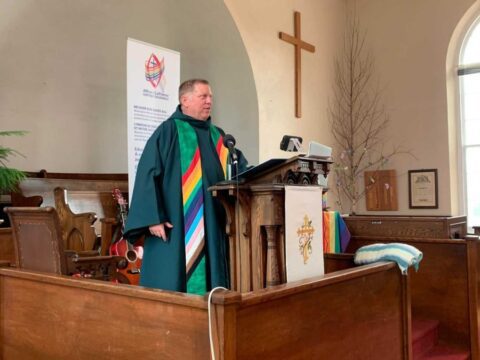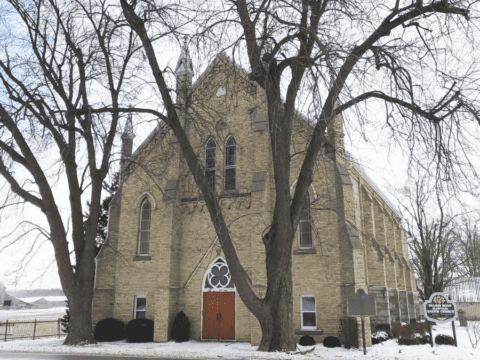Susan Sheppard was a Sunday school dropout. Today, as a lay minister and Christian education specialist at St. James United in St. John’s, N.L., she’s doing everything she can to ensure that the children who come through her church doors keep coming back.
It’s no easy task. Statistics show registration in United Church Sunday schools peaked at about 750,000 in 1960 and is less than 75,000 today. It has dropped by half in the last decade.
You may unsubscribe from any of our newsletters at any time.
Everyone knows the reasons children don’t attend Sunday school: sports and other activities that run seven days a week; a post-Christian culture that doesn’t prioritize church attendance; families in which children are alternating between divorced parents’ homes; households with two working parents who pack all their errands and chores into Saturday and Sunday.
“We certainly can’t blame children for not being present every Sunday when weekly attendance is not a priority of the family or culture,” says Amy Crawford, the General Council Office’s staff person for youth, young teens and children’s programs. “Churches have to deal with changing realities and the demands of the culture.”
And lots are. From the people who create the programming to the folks, like Sheppard, who manage church schools, to the volunteer leaders who deliver programs to kids, many of those involved in Christian education are trying to find ways to adapt. These days, “Sunday school” may not even be on Sunday or seem like school at all. But more often than not, the effort to evolve is paying off.
“It’s not all doom and gloom,” says Rev. Jean Ward, a minister on the Cornwall (P.E.I.) Pastoral Charge. “People are searching for something that gives them a way of being in their lives that’s different and adds some meaning and helps them.”
Sunday school has its roots in 18th-century Great Britain, where it taught child labourers to read, write and embrace Christian values on their only day off. The idea of educating children persists, with many Sunday school programs taking place in age-based classes.
About 50 years ago, says Crawford, churches “got this idea that children should never be bored and that we should keep them entertained all the time.” That tends to limit intergenerational worship. In most United churches, kids begin worship with the rest of the congregation but leave for Sunday school before the sermon starts.
Good curriculum materials, however, can keep children engaged and interested while building Christian knowledge and biblical literacy. The United Church’s New Curriculum — distributed in 1963 and aimed at adults as well as children — spread understanding of the church’s modern liberal approach to theology.
The Whole People of God curriculum, pioneered in 1983 by a group of United churches in Regina, conveyed the same modern message but was built around scripture from the ecumenical lectionary, which goes through the Bible in three-year cycles. Wood Lake Publishing took over the Whole People of God program, and by the late 1990s, it had spread to 10,000 congregations in 20 denominations around the world.
Whole People is still available online, but Wood Lake moved on to develop the Seasons of the Spirit curriculum in 2002. Also based on a liberal Protestant theology, it includes more graphics and illustrations and provides resources for other areas of congregational life.
Tracy Rafuse, the Sunday school co-ordinator at Bridgewater (N.S.) United, uses the Seasons of the Spirit curriculum. She says its ease of use helps solve yet another struggle for today’s Sunday schools: finding enough volunteer leaders.
Church school leaders are typically the parents of young children. Often they’re tired (two working parents is the family norm), unable to attend weekly and have little time to devote to lesson preparation.
At Bridgewater United, Sunday school teachers work in teams of two and set up their own schedules (only one teacher is needed each week). Because the program’s weekly themes are the same for each age group, it’s easy to fold classes together if neither of the co-teachers can attend, says Rafuse. “It’s not as stressful as always having to be there every Sunday.”
Another Sunday school program that takes both teacher shortages and irregular attendance into account is the Workshop Rotation curriculum, first developed in 1990 by a Presbyterian minister in Chicago.
Diaconal minister Deborah Laforet, who oversees Christian education at St. Paul’s United in Oakville, Ont., says the Workshop Rotation curriculum works well; with six-week themes, children can attend two, four or six sessions and learn a little or a lot about the subject. As for teachers, she asks volunteers to commit for three weeks at a time, accounting for half of each unit.
Wood Lake’s president Michael Schwartzentruber doesn’t downplay the fact that shrinking Sunday schools translate into far fewer curriculum sales. Still, he hopes Wood Lake’s latest offering will prove popular.
The newly minted A Place for Everyone Placemat Curriculum (available for September) provides a placemat-sized lesson sheet for every child, with stories, lectionary readings, and arts and crafts guidelines, plus plenty of images and references to pop culture. The curriculum, available for two different age groupings, was developed in conjunction with a Christian education specialist from Scarborough (N.Y.) Presbyterian Church. Each lesson stands on its own, neatly addressing issues of sporadic attendance. Teachers get a compact guidebook but really don’t need to know more than what’s on the children’s sheets. “We certainly do hear from a significant number who say they just don’t have the hours to prepare,” says Schwartzentruber.
Schwartzentruber promises that A Place for Everyone will continue to “reflect values that the United Church holds dear, such as inclusion of all people, equality between the sexes, equality between people of all races and nationalities, justice and concern for the environment.”
More and more Sunday schools are using the Godly Play program, developed by an American Episcopal priest and Montessori educator in the 1990s. Godly Play leaders use props and activities to retell various Bible stories. Children are then asked to imagine how they could fit into the story or to develop an understanding of the story through play.
Rev. Desmond Jagger-Parsons of Trinity United in Kitchener, Ont., says the program shifts learning from “an information-based formula to a play-based formula.” And Rev. Ruth Lumax of First United in Wetaskiwin, Alta., calls it “less a curriculum and more of a spiritual practice.”
Godly Play “opened up a different way of being with children and honouring the sacred in them,” says Lumax. “We may not have huge numbers on Sunday morning, but I think we go a lot deeper in our relationships with children.”
The Godly Play program can be initially expensive, with pricy training sessions and props. Several United Church Christian education specialists, including Amy Crawford, are authorized Godly Play trainers, and courses are readily available.
The program also asks more of leaders, requiring them to attend three “story circle” sessions a year outside Sunday morning, where they experience Godly Play themselves. Lumax, however, says she’s never had so little trouble recruiting and keeping leaders.
As well as providing enjoyable and meaningful experiences for children who show up on Sundays, many United Church congregations are also reaching out to the community with weekday or Saturday programs and special sessions like vacation Bible school.
Monthly Saturday Messy Church events at Trinity United in Kitchener and St. James United in St. John’s have proven a big hit. The informal family-oriented sessions feature games, art, crafts and food. Messy Church is attracting families and children who might not otherwise attend Sunday morning worship, says Trinity’s Jagger-Parsons: “It’s mostly a different congregation.”
In Wetaskiwin, Lumax takes pride in the fact that — according to young participants, most of whom are not from the congregation — First United’s week-long summer vacation Bible camp is the best one in town. It’s limited to 35 children and usually has a waiting list. She says it’s easy to recruit helpers and everyone enjoys themselves. “It’s a hoot; it’s a super-fun week.”
Susan Sheppard, for one, is determined to do whatever she can to keep children in Sunday school. Using a mix of Godly Play and another curriculum aimed at multi-age groups, she’s keeping kids engaged with stories and games, like one designed for Advent: pin the tail on Mary’s donkey. “I think a lot of it is just doing things,” she says. “Young people tell me, if it was just to come and sit in worship service, they wouldn’t come around.”
Crawford, however, would like to see adults and children worship together more often. She wonders if it’s time for the church to move beyond its reliance on Sunday school. “Don’t get me wrong, I’m not saying that children’s involvement in the worshipping life of a congregation or the faith formation of children should not be given the highest priority by congregations,” she says. “But we have to change the way that we imagine and enact ministry with, for and by children.”
***
This story first appeared in The United Church Observer’s March 2013 issue with the title “21st century Sunday school.”












